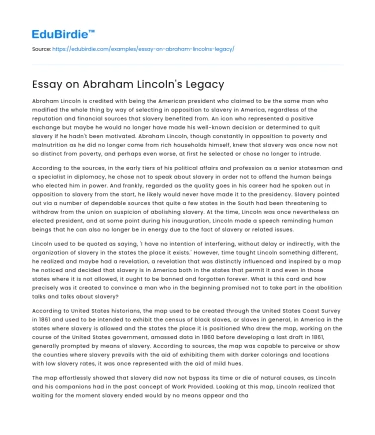Introduction
Abraham Lincoln, the 16th President of the United States, is often revered as one of the most significant figures in American history. His leadership during the tumultuous years of the Civil War not only preserved the Union but also paved the way for the abolition of slavery, thus reshaping the moral and political landscape of the nation. Lincoln's legacy is characterized by his steadfast commitment to equality, democracy, and resilience in the face of adversity. This essay delves into the enduring impact of Lincoln’s presidency, exploring his contributions to emancipation, his influence on American political thought, and the counter-arguments to his legacy. By analyzing these aspects, we gain a comprehensive understanding of why Lincoln remains a pivotal figure in both historical and contemporary contexts.
Emancipation and Equality
Abraham Lincoln's most celebrated achievement is undoubtedly the Emancipation Proclamation, a milestone in the fight against slavery. Issued on January 1, 1863, the proclamation declared the freedom of all enslaved people in Confederate-held territory. This executive order was not merely a war measure; it was a profound statement of moral and political intent. As historian Eric Foner notes, the proclamation transformed the Civil War into a struggle for human liberty, elevating the cause of freedom to a central tenet of American identity (Foner, 2010). Lincoln's commitment to emancipation was further solidified by his advocacy for the Thirteenth Amendment, which formally abolished slavery throughout the United States.
Save your time!
We can take care of your essay
- Proper editing and formatting
- Free revision, title page, and bibliography
- Flexible prices and money-back guarantee
Despite criticism from some quarters that Lincoln's actions were driven more by political expediency than moral conviction, his speeches and writings reveal a deep-seated belief in equality. In his famous Gettysburg Address, Lincoln articulated the principle of a "new birth of freedom," envisioning a nation where democracy would be truly representative of all its people. This vision laid the groundwork for future civil rights movements, inspiring generations to fight for equality and justice. Countering the argument that Lincoln was a reluctant emancipator, scholars like Allen C. Guelzo stress that Lincoln’s gradual approach was a strategic necessity to maintain the Union and garner support from various factions (Guelzo, 2012).
Political Thought and Leadership
Lincoln's political philosophy and leadership style have had a lasting influence on American governance and democracy. His ability to navigate the multifaceted challenges of his presidency demonstrated a unique blend of pragmatism and idealism. Lincoln's eloquence and rhetorical prowess were instrumental in rallying support for the Union cause. As Doris Kearns Goodwin highlights in her work, Lincoln's inclusive leadership was evident in his "Team of Rivals" approach, where he surrounded himself with individuals of differing opinions to foster debate and innovation (Goodwin, 2005).
Moreover, Lincoln's dedication to preserving the Union was a testament to his belief in the American experiment of democracy. His Second Inaugural Address, often cited as one of his greatest speeches, reflects a deep understanding of the complexities of governance and reconciliation, urging "malice toward none, with charity for all" as the nation began to heal from the civil war (Lincoln, 1865). Critics may argue that Lincoln's suspension of habeas corpus and other wartime measures were an overreach of presidential power. However, defenders assert that these actions were necessary to safeguard the nation during its most perilous times, a testament to his commitment to the Constitution and the principles it embodies.
Legacy and Counterarguments
Lincoln's legacy is not without its detractors. Some historians argue that his views on race were not as progressive as his actions might suggest. For instance, early in his political career, Lincoln supported the colonization of freed African Americans, a stance that seems contradictory to his later achievements. However, as James Oakes argues, Lincoln's views evolved significantly over time, driven by the exigencies of war and the moral imperative of equality (Oakes, 2007). This evolution reflects the complexity of Lincoln's character and the dynamic nature of his presidency.
Additionally, there are debates about the effectiveness of Lincoln's policies during Reconstruction and their long-term impact on race relations in the United States. While he laid the foundation for civil rights advancements, the subsequent failure of Reconstruction and the rise of Jim Crow laws highlight the unfinished nature of his work. Nevertheless, Lincoln's vision for a united and equitable America continues to inspire policymakers and activists alike, serving as a benchmark for evaluating progress in civil rights.
Transitioning from the analysis of his policies to their contemporary relevance, it is evident that Lincoln's ideals continue to resonate in modern discussions about equality and democracy. The enduring debates around his legacy underscore the complexity of historical interpretation and the multifaceted nature of societal progress.
Conclusion
In conclusion, Abraham Lincoln's legacy is a multifaceted tapestry of leadership, morality, and enduring influence on American society. His pivotal role in the abolition of slavery and preservation of the Union signifies a profound commitment to the ideals of democracy and equality. Despite criticisms and unresolved challenges from his era, Lincoln's vision of a united and just society remains a guiding light for future generations. His legacy compels us to reflect on the progress made and the work still required to achieve a truly equitable nation. As we continue to grapple with issues of race, justice, and democracy, Lincoln's life and presidency offer valuable lessons in resilience, adaptability, and the enduring pursuit of a more perfect union.






 Stuck on your essay?
Stuck on your essay?

